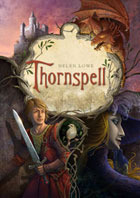Helen Lowe's Blog, page 308
February 9, 2011
Influences on Story 3: Other Writing
It's been quite a while since I've done an "Influences on Story" post—21 July 2010 in fact—but Tarantella, my Tuesday Poem post for this week, made me think about the influence of other writing in sparking new stories. Tarantella may be a poem, but it still contains stories—and questions a-plenty around those stories.
At first reading, the poem is the story of a dance and an inn in the "High Pyrenees." So instantly we have location, in the border country between France and Spain. We also have the dance and the dancer:
" … the clap
Of the hands to the swirl and the twirl
Of the girl gone chancing,
Glancing,
Dancing,
Backing and advancing,
Snapping of the clapper to the spin
Out and in —
And the ting, tong, tang of the guitar!"
The language is so evocative that we can see and hear the dancer moving—"the snapping of the clapper to the spin." We can also see and hear, smell and feel the scene at the inn:
" … the spreading
Of the straw for a bedding,
And the fleas that tease in the High Pyrenees,
And the wine that tasted of tar?
And the cheers and the jeers of the young muleteers
(Under the vine of the dark veranda)? …
… And the hammer at the doors and the din?"
Doesn't it just take you there?
Yet the story doesn't only lie in the colourful and evocative descriptions of dancer and inn. The poem begins with a question:
"Do you remember an Inn,
Miranda?"
The question is repeated throughout the first part of the poem and leaves us with our own puzzle, as readers: Who is the narrator? And who is Miranda? What is their relationship to each other? What were they doing at this rough inn in the High Pyrenees?
If we have a storyteller in us, we will want to answer those questions—and the appetite to first speculate and then spin answers is sharpened by the second part of the poem, which begins with the lines:
"Never more;
Miranda,
Never more."
We learn that the inn and the dancer and the muleteers, and all those who created a din and hammered at the doors, are gone:
"Only the high peaks hoar;
And Aragon a torrent at the door.
No sound …
… No sound:
But the boom
Of the far waterfall like doom."
Why? As readers, we wonder: Why are the inn and the people all gone? Why does only a powerful and isolate nature remain? Given the location, and the life span of the poet, Hilaire Belloc (1870-1953), my first guess was that the story might have had something to do with the Spanish Civil War, which was savage and bloody and swept many communities away. But the publication date for the poem is 1930, predating the Civil War of 1936-1939, so an easy historical answer is not forthcoming. And poetry, like the novel and short stories, is often completely fictional. Yet still the questions persist: What is the narrator and Miranda's story? What happened to the inn and the people in it, and why?
The moment, lacking "real" answers, that we begin to weave imagined answers into story we are spinning a new thread into the fiction web, one which may—and likely will—be profoundly different from whatever was in Belloc's mind when he wrote Tarantella, for example. But I believe it is a truth worthy of "universal acknowlegment" that every time we read a book, or a poem, or a short story, and feel a "but what if" sparked, that spark has a profound influence on our own stories.
In its most immediate from, this influence becomes fan fiction, but often we recognize the "spark" in stories that are decidedly their own fiction. "What if", for example, Arwen could have married Aragorn in The Lord of the Rings and not become mortal? In David Eddings' Belgariad series we find an immortal woman who believes that she must and will lose her immortality if she marries her mortal love—but finds, to her considerable surprise, that he is raised to immortality instead. Most of us who have read The Lord of the Rings appreciate the irony, without ever mistaking one story for the other.
The sheer number of retellings of the King Arthur cycle and The Illiad and The Odyssey stories—and more recently Ursula Le Guin's Lavinia, which is an alternate take on the Aeneid—are an enduring testament to the power of one story to influence and shape others. 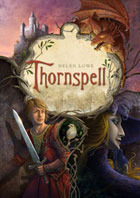 My own Thornspell is just such shaping, seeking to answer the "what if" of the prince's backstory in the traditional Sleeping Beauty—and the "why" behind both his actions and those of the wicked fairy.
My own Thornspell is just such shaping, seeking to answer the "what if" of the prince's backstory in the traditional Sleeping Beauty—and the "why" behind both his actions and those of the wicked fairy.
So what do you think? Do you have a favourite spin-off of an old story? Or is there a "what if" or "why" from a novel, or short story, or poem, that you would like to see addressed through new fiction?
February 8, 2011
International Literary Quarterly: A New Zealand Literary Showcase
Issue 14 of the International Literary Quarterly (Interlitq) will comprise 3 installments showcasing what the Editorial Board has described as "the depth of literary talent coming out of New Zealand."
The first installment of "A New Zealand Literary Showcase" will be published in February " … with contributions by Coral Atkinson, Marisa Cappetta, Laurice Gilbert, Helen Lowe, Cilla McQueen, Sue Orr, Harry Ricketts, Ron Riddell, Richard Von Sturmer and Niel Wright."
I am very pleased to have poetry included in Interlitq's "A New Zealand Literary Showcase," in company with so many fine New Zealand writers. The poems you will soon have the opportunity to see are:
Australia Post
One Day (from the Ithaca Conversations sequence);
Place
Starman; and
Today, your house is cold (first line).
February 7, 2011
Tuesday Poem: "Tarantella" by Hilaire Belloc
Do you remember an Inn,
Miranda?
Do you remember an Inn?
And the tedding and the spreading
Of the straw for a bedding,
And the fleas that tease in the High Pyrenees,
And the wine that tasted of tar?
And the cheers and the jeers of the young muleteers
(Under the vine of the dark veranda)?
Do you remember an Inn, Miranda,
Do you remember an Inn?
And the cheers and the jeers of the young muleteers
Who hadn't got a penny,
And who weren't paying any,
And the hammer at the doors and the din?
And the hip! hop! hap!
Of the clap
Of the hands to the swirl and the twirl
Of the girl gone chancing,
Glancing,
Dancing,
Backing and advancing,
Snapping of the clapper to the spin
Out and in —
And the ting, tong, tang of the guitar!
Do you remember an Inn,
Miranda?
Do you remember an Inn?
Never more;
Miranda,
Never more.
Only the high peaks hoar;
And Aragon a torrent at the door.
No sound
In the walls of the halls where falls
The tread
Of the feet of the dead to the ground,
No sound:
But the boom
Of the far waterfall like doom.
Hilaire Belloc, 1870-1953
—
I was first introduced to this poem at High School by a teacher who not only loved it, but read it aloud with great energy and enthusiasm—and I believe that it is a poem that repays being read aloud, to see the way in which the effect of the rhyme and rhythm, and the use of onomatopoeia, work together to imitate the sense and sound of the dance and the whole frenetic energy of the evening in the inn. The repetiton of words and phrases also reinforces the energy and the way action, whether of the dance or the young muleteers cheering and jeering, tends to repeat in that kind of scene.
Although this was not a poem that we 'learned by heart', key phrases have always stayed with me from that one reading:
"And the cheers and the jeers of the young muleteers
Who hadn't got a penny,
And who weren't paying any …"
What Year 9 student wouldn't love that concept?
And the more elegaic lines such as:
"And Aragon a torrent at the door"—what a powerful image (she shouts, joyfully!); possibly the reason that it has stayed with me for so many years.
February 6, 2011
Book Giveaway Result

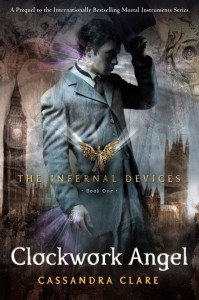 Apologies for the delay—the sorting hat has now sorted and the book giveaway of Thornspell and The Clockwork Angel, from my release day interview with Beth-Anne Miller, has been won by:
Apologies for the delay—the sorting hat has now sorted and the book giveaway of Thornspell and The Clockwork Angel, from my release day interview with Beth-Anne Miller, has been won by:
Gwen Roman.
Congratulations, Gwen!
You may recall that to be eligible for the giveaway readers had to comment and share their "preferred historical period & location for a romantic time-travel getaway."
Gwen's choice was:
"One time period that always strikes me as hearbreakingly romantic is Paris between the world wars. Ooh! Or the Gilded Age in New York. *sigh* Yeah."
—
The other times/places put forward were:
"I think I'd like to be able to revisit times within my own life (ala Henry in The Time Traveler's Wife) so I could appreciate people and places I miss, and see the things I didn't pay attention to then." — Wen
"I'd like to visit the 1500s in England or Italy, and be well-off enough to be romantically comfortable, but not so close to thrones to be in serious danger of getting caught up in dangerous political machinations! It would be lovely to have been an inspiration for Michelangelo, Titian or Holbein … " — Heather
" … my favourite historical period for a romantic getaway would have to be New York during the Roaring Twenties, which was also called the Jazz Age. Jazz, flappers, the Charleston, speakeasies—it's the stuff of which romance is made, but also adventure, with such a heady sense of "the new, the new." — Helen
"The earlist I could go back was 1960s. Preferably America as it seems an exciting time in history. And the time travel would do something to my moleular structure so I'd be a tall, skinny blonde with a never ending supply of cash." — Jan
"We'd love to holiday in Liverpool, England in the early 1960′s – maybe 1961 – to catch "The Beatles" when they play at the Cavern. Seeing the other bands who didn't quite make it would be an added bonus. The food, the clothing, and the language would all be retro relaxing experiences – sort of familiar but more real." — Kay
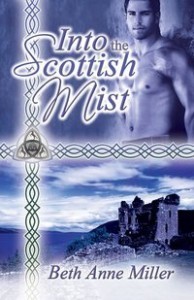 Interesting that the majority of the historical periods chosen were so recent. But there it is—and I think we can now say that Into the Scottish Mist is well and truly launched.
Interesting that the majority of the historical periods chosen were so recent. But there it is—and I think we can now say that Into the Scottish Mist is well and truly launched. 
February 5, 2011
What I'm Reading: "Leviathan" & "A Shadow In Summer"
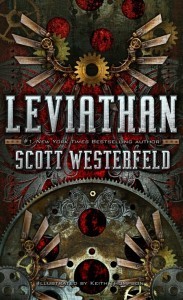 I have finished reading "Leviathan" by Scott Westerfeld and was very impressed by the amazing world that he has built, juxtaposing the genetically-engineered "creations" of a "Darwinist" British Empire with the mechanical creations (i.e. "clanks") of "Clanker" Germany and Austria-Hungary. As a lover of history I also loved the alternate history retelling of the origins of World War 1. The reading age was younger than I had expected, though—I would class this as "Junior" fiction rather than "YA"—and that did affect my enjoyment of the story. My other reservation was that the foolish decisions made by one of the two main characters, Alex, did start to irritate me after a while, but I am not sure that younger readers (for whom the story is written, after all) would notice that so much. I suspect those who love Temeraire/His Majesty's Dragon and the Immortal Engines stories of Philip Reeves will potentially enjoy Leviathan, while noting my comment about reading age. I do think anyone who loves steampunk and alternate history should check Leviathan out regardless though, just for the sheer ambition of the world building alone.
I have finished reading "Leviathan" by Scott Westerfeld and was very impressed by the amazing world that he has built, juxtaposing the genetically-engineered "creations" of a "Darwinist" British Empire with the mechanical creations (i.e. "clanks") of "Clanker" Germany and Austria-Hungary. As a lover of history I also loved the alternate history retelling of the origins of World War 1. The reading age was younger than I had expected, though—I would class this as "Junior" fiction rather than "YA"—and that did affect my enjoyment of the story. My other reservation was that the foolish decisions made by one of the two main characters, Alex, did start to irritate me after a while, but I am not sure that younger readers (for whom the story is written, after all) would notice that so much. I suspect those who love Temeraire/His Majesty's Dragon and the Immortal Engines stories of Philip Reeves will potentially enjoy Leviathan, while noting my comment about reading age. I do think anyone who loves steampunk and alternate history should check Leviathan out regardless though, just for the sheer ambition of the world building alone.
—
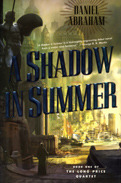 I have also just finished reading Daniel Abraham's A Shadow in Summer, the first in "The Long Price" quartet. You may recall that this was recommeded on HarperVoyager USA recently when I guest posted on it being Hugo Award nomination time again and also mentioned Tor.com's quest to identify a readers' choice for the Best SciFi-Fantasy Novel for the Decade. I have been keen to check out a few of the recommended books that I hadn't read previously and A Shadow in Summer was first off the blocks.
I have also just finished reading Daniel Abraham's A Shadow in Summer, the first in "The Long Price" quartet. You may recall that this was recommeded on HarperVoyager USA recently when I guest posted on it being Hugo Award nomination time again and also mentioned Tor.com's quest to identify a readers' choice for the Best SciFi-Fantasy Novel for the Decade. I have been keen to check out a few of the recommended books that I hadn't read previously and A Shadow in Summer was first off the blocks.
So did I like it? Yes, I did. As a poet, how could I resist a premise where poets are a fundamental part of the magic of the world? I also found the core premise of the magic intriguing (I am not going to say more because I don't want to spoil the 'freshness' when you come to read it for yourself) and the world itself, which is fundamentally "Japanese/oriental" in conception very well drawn. The characterisation was also excellent and I think anyone who enjoys character-driven fiction, as well as those who love world building, will get something out of this book. The action lies in politics, personalities and intrigue, rather than grand campaigns, so this probably won't appeal so much to those who like straightforward stories with plenty of sword and sorcery action. In terms of quibbles, I am still not sure I fully "got" the ending (i.e. I got what happened, but not necessarily the raison d'etre behind what one character in particular did), so I am probably going to go back and read that part again. But I already have the next book in the quartet, A Betrayal in Winter, to read and am definitely looking forward to doing so.
February 4, 2011
What I've Been Doing … And What's Coming Up

Island Bay, Wellington
I have recently spent some time in Wellington, NZ's capital city. I went up for the memorial service for fellow Tuesday Poet, Harvey McQueen, which was held in Old St Pauls on Friday 28 January. The ceremony was moving and inspiring, as well as sad, and I am glad I made the effort to attend and farewell Harvey, even though I had only known him for a relatively short time compared to many others there.
While in Wellington, I also took the opportunity to meet up with fellow Tuesday Poets and also with speculative fiction author, Mary Victoria, and attend the Red 5 Book Group (a lively speculative fiction book group) on the evening of Monday 31. As authors we work so much in isolation that the chance to spend time with fellow writers was a very welcome one—and of course with 'so much to talk about' and not nearly enough time!
Right now is a particularly exciting and busy time for Mary because her second novel, Samiha's Song, is being launched today in the Weta Cave. And speaking of Weta, I also got to have lunch with Mary and her husband, artist Frank Victoria, in the dining room for Weta Studios—right at the 'beating heart' of the NZ-based film industry. And with The Hobbit film in-train just around the corner, I am enough of an SFF geek gal to feel that my cool cred. has increased exponentially as a result. 
Back home again in Christchurch, it was time to work on blog interviews—with Beth Anne Miller for the Supernatural Underground and my own blog, and also with Mary Victoria for February 15 (watch this space.) I'm also working on finishing off my "Writing Strong Women" guest post for Mary, as part of the guest author series she's running around the release of Samiha's Song, and also another guest post for Concatenation, a UK based SFF site, ahead of the launch of The Heir of Night in the UK on March 3.
Yup, March 3—the UK launch really is that close and later in the week I'll be bringing you a sneak preview on some of the celebratory excitement that will be happening here on the 'big day.'

Work in Progress: WALL2
The main thing that's been happening this week though is that I've been waiting for the ms of The Gathering of the Lost (The Wall of Night Series Book Two) to arrive back on my desk from my editor, Kate, in the US—and arrive it finally did yesterday, all 4-5 inches of it (!), so I am going to be very busy working on that over the next while. But I'm looking forward to it, because so many ideas have been revolving around in my head over the past month since I completed the ms that it will be good to get back into it and begin working through them. And this next round is my favourite part of the process, where you take the basic form of the story and start to add the subtleties—texture, nuance, depth …
February 3, 2011
Release Day Interview with Beth Anne Miller—Plus Giveaway!
 Today, Friday 4 February is release day for Into the Scottish Mist, the debut romance novel from my friend Beth Anne Miller. I interviewed Beth Anne on the Supernatural Underground on Tuesday, but because a debut novel is such a big deal (in my book anyway!) I just had to do another interview with Beth Anne right here on "… Anything, Really" as well, for extra celebratory fun! And we have managed a few different questions, so can promise you something new!
Today, Friday 4 February is release day for Into the Scottish Mist, the debut romance novel from my friend Beth Anne Miller. I interviewed Beth Anne on the Supernatural Underground on Tuesday, but because a debut novel is such a big deal (in my book anyway!) I just had to do another interview with Beth Anne right here on "… Anything, Really" as well, for extra celebratory fun! And we have managed a few different questions, so can promise you something new!
To further celebrate Beth Anne's debut, I am putting up a giveaway book set to be drawn from amongst those who comment before 12 midnight, US Eastern Standard Time, on Friday 4 (so that will take Australasian and some other readers over into "extra time" on Saturday.  ) Giveaway details follow the interview!
) Giveaway details follow the interview!
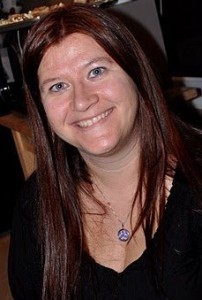 But now to introduce Beth Anne, she is a lifelong New Yorker and has been an avid reader since a ridiculously young age and is often in the middle of several books at once. (Rumor, she alleges, has it she was reading street signs at around 2, but this could be an urban legend!) A road trip through the eerie moors and misty Highlands of Scotland provided the inspiration for Into The Scottish Mist. A keen scuba diver and lover of all things Scottish, Beth Anne currently works in the publishing industry in New York City and is planning her next road trip. Into The Scottish Mist is her first novel—so welcome Beth Anne!
But now to introduce Beth Anne, she is a lifelong New Yorker and has been an avid reader since a ridiculously young age and is often in the middle of several books at once. (Rumor, she alleges, has it she was reading street signs at around 2, but this could be an urban legend!) A road trip through the eerie moors and misty Highlands of Scotland provided the inspiration for Into The Scottish Mist. A keen scuba diver and lover of all things Scottish, Beth Anne currently works in the publishing industry in New York City and is planning her next road trip. Into The Scottish Mist is her first novel—so welcome Beth Anne!
Beth Anne: Thanks, it's great to be here today.
Helen: One challenging question that came out of the Supernatural Underground interview was a request that you provide a Twitter-length "pitch", summing up Into the Scottish Mist. I was very impressed when you came back with: "Scottish actor Ian follows his estranged love Abby through the mist by Loch Ness. 400 years in the past, they must end a clan feud or sacrifice their happiness." Was it tough summarising your book down to tweet length?
Beth Anne: Yes, it really was! I had a brief summary that I'd done previously, but when I brought it up on screen, it was 500+ characters! I played around with it for a few minutes, and then I realized I also had a one-line quick phrase, which was only about 60 characters. So I expanded that a little, and came up with the line you mentioned above. It was a great exercise, though. I think it's important to be able to summarize your story in a quick line or two. It makes you think about what's really important to the plot and story arc.
Helen: Beth Anne, in an earlier conversation, you said to me: "Though romance has become one of the biggest-and-best-selling fiction genres out there, some people still look upon it with disdain." So here's the two-part question:
i) Why do you think it is that romance is looked on with disdain by some?
Beth Anne: Even though romance novels and authors get a lot more respect than they used to, I think that there are plenty of people who still think that romance fiction is all about empty-headed heroines, jacked-up heroes, and no plot to speak of. I strongly disagree with this. Most romance authors put a huge amount of research into their novels. I've learned a lot about colonial America, British history, various law-enforcement techniques, and a slew of other things from romance novels. Just because the main plot line involves two people finding their happily-ever-after doesn't mean the story isn't richly detailed.
ii) You're a pretty smart gal, with two degrees in both science and literature—so why do you personally enjoy this "disdained" genre?
Beth Anne: I think it's fair to say that most of us read fiction to escape, whether it's an escape into a fantasy world, or an exotic locale, or just to take a journey with a fictional character into a life that's different from ours. I've been an avid reader of romance novels for almost as long as I can remember because they offer escapism and a happy ending, which isn't a bad thing, given how awful real-life can sometimes be. They also generally include a hero that we can fall in love with, which is one of the most important aspects of a romance novel—and my favorite part!
Helen: So what do you think are some of the essential elements of a successful romance—as a reader, what are you looking for?
Beth Anne: A required element of a romance novel is the "happily-ever-after". Without one, a book can be many things, but technically it's not a romance novel. For those of us who read to escape from the trials and tribulations of our everyday lives, knowing a book is going to end happily can be really important. You don't have to worry that the hero is going to decide that the woman across the hall is a better choice than the heroine, or that the heroine is going to be fed up with the hero's sloppiness around the house and walk out on him. You know that at the end of whatever adventure, heartache, or drama these two characters are forced to endure, they will end up together—and happy!—at the end. I don't think it will be spoiling anything to reveal that Ian Mackenzie and Abby Sanders end up living happily-ever-after at the end of Into The Scottish Mist!
The hero is also very important. When I read a romance, I want to fall in love with the hero. I want him to have the right combination of strength and vulnerability to make me feel like he can protect me from the bad guys but sometimes just need a hug. He needs to be confident, but occasionally he has those same dark moments of self-doubt that we all have. And since it's fiction, it's okay to say that he has to be easy on the eyes as well. Ian Mackenzie is a big, strapping man. He has had extensive training with swordplay and is an expert horseman, both of which have been of great use to him as an actor. When he finds himself 400 years in the past, these skills are essential for his survival, but fighting with a blunted sword and a stunt double is drastically different from fighting for his life with a real sword against a real enemy, no stunt double in sight.
And probably the other important element of romance is the escape to an exotic location. Many of us live unexciting lives, for the most part. We wake up, go to work, come home, cook dinner, take care of the kids, etc., and then do it all again the next day. Romance novels offer an escape to the Old West, to Regency England, to the Scottish Highlands, to a sun-kissed Caribbean Island (which given the winter New York is currently experiencing, sounds darn good right about now!), to the Australian Outback, and sometimes to a fantasy world. They offer us a few hours (or days, depending on your reading speed) of escape to another place or time, where we can experience someone else's life. It's a lot easier and cheaper than airplane travel, and it can help you pick your next vacation spot!
Helen: You've chosen Scotland as your setting for Mist—and it has featured as a romantic location from the novels of Walter Scott to those of Diana Gabaldon. What are three things that make Scotland a romantic location for you?
Beth Anne: I've had a particular fascination with Scotland for many years, for no particular reason. I don't have a Scottish heritage, and it's only in recent years that I've had the opportunity to travel there. But I agree that many romance authors have chosen Scotland as the setting for their novels, and there are a few really good reasons for this:
Castles! Castles have long been associated with stories of romance. I don't know any girls who haven't at one point or another imagined they are princesses living in castles with turrets and moats and handsome knights in shining armor. You can't travel too far in Scotland without running into the ruin of a centuries-old castle, and though the cold reality of those crumbling stones may be a far cry from the sparkling walls of our dream castles, it just requires a little imagination to restore that ruin to its former glory and picture what it could have been. Into The Scottish Mist doesn't take place in a castle, but the story is set against the backdrop of the beautiful Urquhart Castle, which stands sentinel on the western shore of Loch Ness.
Misty glens and standing stones … Scotland is full of spectacular scenery, from snow-covered mountains to sparkling blue lochs, to green fields and glens, but there's something about coming upon a 5,000-year-old stone circle shrouded in mist that makes you think you've crossed into a faerie realm or through a portal in time. And as Diana Gabaldon, Lynn Kurland, Karen Marie Moning, and many, many other romance authors have shown us over the years, there is much romance to be had centuries in the past or in a parallel world. Into The Scottish Mist has both, though it's the mist that provides the portal to the past.
Scotsmen, preferably in kilts!  Let's face it, there's not much that's more pleasing to the ears than a Scottish burr. Sean Connery, Gerard Butler, Craig Ferguson, John Hannah—I could listen to any of these guys read the phone book! Throw any of these guys into a kilt, and let the swooning begin! Into The Scottish Mist has Ian Mackenzie, who is based on a photo of Gerard Butler from the TV movie Attila, in which he has long, wavy, dark hair and intense blue-green eyes. He looks darn good in a kilt, and his accent will make you melt.
Let's face it, there's not much that's more pleasing to the ears than a Scottish burr. Sean Connery, Gerard Butler, Craig Ferguson, John Hannah—I could listen to any of these guys read the phone book! Throw any of these guys into a kilt, and let the swooning begin! Into The Scottish Mist has Ian Mackenzie, who is based on a photo of Gerard Butler from the TV movie Attila, in which he has long, wavy, dark hair and intense blue-green eyes. He looks darn good in a kilt, and his accent will make you melt.
Helen: Georgette Heyer talked about the "Mark 1″ ("The brusque, savage sort with a foul temper") and "Mark 2″ ("Suave, well-dressed, rich, and a famous whip"—Aiken-Hodge, 49) hero—and given the importance of the romantic hero to the genre, what do you think are the three essential qualities for the hero in a novel such as Mist?
Beth Anne: I think that although there's nearly always some suspension of disbelief required in a romance novel, the hero still needs to be believable and relatable. He can't be so larger than life and such a Superman that he's no longer just a guy. He has to have some flaw somewhere, whether it's physical or in his personality, because none of us is perfect. For me, the hero needs to be strong and protective. He stands up for those whom he loves, and would do anything to protect them. He almost always knows what to do in any situation, but like any "real-life" man, has to sometimes admit that he doesn't have the answer, or worries that he made the wrong decision and it will cost him something he holds dear, whether it's the heroine, his honor, his life, etc.
Helen: If you could only take one romance novel onto a desert island, which one would it be? Why?
Beth Anne: You're killing me, Helen. Just one? I have an e-reader… Okay, I'm staring at my bookshelves now, trying to pick one. I assume that a 3-in-1, with three novels in one book, doesn't count? If I had to choose just one to bring with me, I think I'd have to say Diana Gabaldon's Outlander.* It has Jamie Fraser, one of the best and most memorable romance heroes ever, Scotland, time travel, rich historical detail, adventure, bad guys, true love—and it's like 800+ pages long, so it'll keep me occupied for quite a while on that desert island.
Helen: To finish, if Mist had been written by someone else and you were recommending it to a friend, what would you say?
Beth Anne: I would say that it's a novel that I think has something for everyone: a sexy hero, a strong heroine, Scotland, romance, swordfighting, fantasy, humor, memorable secondary characters, a heroic wolf, and Blackjack, a really cool horse. If you like Lynn Kurland, Karen Marie Moning, and Diana Gabaldon, then you might like Into The Scottish Mist.
Helen: Blackjack is a very cool horse!  Beth Anne—thank you for being my guest on " … Anything, Really" today and congratulations on the publication of Into the Scottish Mist. I hope you celebrate in style with a dram of something 'Scottish' and go on to "sell a million!"
Beth Anne—thank you for being my guest on " … Anything, Really" today and congratulations on the publication of Into the Scottish Mist. I hope you celebrate in style with a dram of something 'Scottish' and go on to "sell a million!"
* Cross Stitch to UK, Aus, NZ readers.
—
Release day is always celebration day—and even more so when the book being released is a first novel. To celebrate publication of Into the Scottish Mist today I have a two-book set of Thornspell (written by me!  ) and Cassandra Clare's A Clockwork Angel to giveaway.
) and Cassandra Clare's A Clockwork Angel to giveaway.
To go in the draw, enter a comment on this post before 12 midnight, US Eastern Standard Time (EST), on Friday 4 telling us the preferred historical period & location for your romantic time-travel getaway. The winner will be drawn from the Sorting Hat and posted before midnight Saturday 5, US EST.
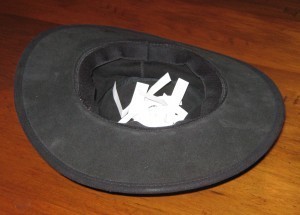
The Sorting Hat
Please don't forget to check back after the closing date to see if you've won. If the prize has not been claimed by midnight EST on Monday 7, I will re-draw.
Release Day Interview with Beth Anne Miller
 Today, Friday 4 February is release day for Into the Scottish Mist, the debut romance novel from my friend Beth Anne Miller. I interviewed Beth Anne on the Supernatural Underground on Tuesday, but because a debut novel is such a big deal (in my book anyway!) I just had to do another interview with Beth Anne right here on "… Anything, Really" as well, for extra celebratory fun! And we have managed a few different questions, so can promise you something new!
Today, Friday 4 February is release day for Into the Scottish Mist, the debut romance novel from my friend Beth Anne Miller. I interviewed Beth Anne on the Supernatural Underground on Tuesday, but because a debut novel is such a big deal (in my book anyway!) I just had to do another interview with Beth Anne right here on "… Anything, Really" as well, for extra celebratory fun! And we have managed a few different questions, so can promise you something new!
To further celebrate Beth Anne's debut, I am putting up a giveaway book set to be drawn from amongst those who comment before 12 midnight, US Eastern Standard Time, on Friday 4 (so that will take Australasian and some other readers over into "extra time" on Saturday.  ) Giveaway details follow the interview!
) Giveaway details follow the interview!
 But now to introduce Beth Anne, she is a lifelong New Yorker and has been an avid reader since a ridiculously young age and is often in the middle of several books at once. (Rumor, she alleges, has it she was reading street signs at around 2, but this could be an urban legend!) A road trip through the eerie moors and misty Highlands of Scotland provided the inspiration for Into The Scottish Mist. A keen scuba diver and lover of all things Scottish, Beth Anne currently works in the publishing industry in New York City and is planning her next road trip. Into The Scottish Mist is her first novel—so welcome Beth Anne!
But now to introduce Beth Anne, she is a lifelong New Yorker and has been an avid reader since a ridiculously young age and is often in the middle of several books at once. (Rumor, she alleges, has it she was reading street signs at around 2, but this could be an urban legend!) A road trip through the eerie moors and misty Highlands of Scotland provided the inspiration for Into The Scottish Mist. A keen scuba diver and lover of all things Scottish, Beth Anne currently works in the publishing industry in New York City and is planning her next road trip. Into The Scottish Mist is her first novel—so welcome Beth Anne!
Beth Anne: Thanks, it's great to be here today.
Helen: One challenging question that came out of the Supernatural Underground interview was a request that you provide a Twitter-length "pitch", summing up Into the Scottish Mist. I was very impressed when you came back with: "Scottish actor Ian follows his estranged love Abby through the mist by Loch Ness. 400 years in the past, they must end a clan feud or sacrifice their happiness." Was it tough summarising your book down to tweet length?
Beth Anne: Yes, it really was! I had a brief summary that I'd done previously, but when I brought it up on screen, it was 500+ characters! I played around with it for a few minutes, and then I realized I also had a one-line quick phrase, which was only about 60 characters. So I expanded that a little, and came up with the line you mentioned above. It was a great exercise, though. I think it's important to be able to summarize your story in a quick line or two. It makes you think about what's really important to the plot and story arc.
Helen: Beth Anne, in an earlier conversation, you said to me: "Though romance has become one of the biggest-and-best-selling fiction genres out there, some people still look upon it with disdain." So here's the two-part question:
i) Why do you think it is that romance is looked on with disdain by some?
Beth Anne: Even though romance novels and authors get a lot more respect than they used to, I think that there are plenty of people who still think that romance fiction is all about empty-headed heroines, jacked-up heroes, and no plot to speak of. I strongly disagree with this. Most romance authors put a huge amount of research into their novels. I've learned a lot about colonial America, British history, various law-enforcement techniques, and a slew of other things from romance novels. Just because the main plot line involves two people finding their happily-ever-after doesn't mean the story isn't richly detailed.
ii) You're a pretty smart gal, with two degrees in both science and literature—so why do you personally enjoy this "disdained" genre?
Beth Anne: I think it's fair to say that most of us read fiction to escape, whether it's an escape into a fantasy world, or an exotic locale, or just to take a journey with a fictional character into a life that's different from ours. I've been an avid reader of romance novels for almost as long as I can remember because they offer escapism and a happy ending, which isn't a bad thing, given how awful real-life can sometimes be. They also generally include a hero that we can fall in love with, which is one of the most important aspects of a romance novel—and my favorite part!
Helen: So what do you think are some of the essential elements of a successful romance—as a reader, what are you looking for?
Beth Anne: A required element of a romance novel is the "happily-ever-after". Without one, a book can be many things, but technically it's not a romance novel. For those of us who read to escape from the trials and tribulations of our everyday lives, knowing a book is going to end happily can be really important. You don't have to worry that the hero is going to decide that the woman across the hall is a better choice than the heroine, or that the heroine is going to be fed up with the hero's sloppiness around the house and walk out on him. You know that at the end of whatever adventure, heartache, or drama these two characters are forced to endure, they will end up together—and happy!—at the end. I don't think it will be spoiling anything to reveal that Ian Mackenzie and Abby Sanders end up living happily-ever-after at the end of Into The Scottish Mist!
The hero is also very important. When I read a romance, I want to fall in love with the hero. I want him to have the right combination of strength and vulnerability to make me feel like he can protect me from the bad guys but sometimes just need a hug. He needs to be confident, but occasionally he has those same dark moments of self-doubt that we all have. And since it's fiction, it's okay to say that he has to be easy on the eyes as well. Ian Mackenzie is a big, strapping man. He has had extensive training with swordplay and is an expert horseman, both of which have been of great use to him as an actor. When he finds himself 400 years in the past, these skills are essential for his survival, but fighting with a blunted sword and a stunt double is drastically different from fighting for his life with a real sword against a real enemy, no stunt double in sight.
And probably the other important element of romance is the escape to an exotic location. Many of us live unexciting lives, for the most part. We wake up, go to work, come home, cook dinner, take care of the kids, etc., and then do it all again the next day. Romance novels offer an escape to the Old West, to Regency England, to the Scottish Highlands, to a sun-kissed Caribbean Island (which given the winter New York is currently experiencing, sounds darn good right about now!), to the Australian Outback, and sometimes to a fantasy world. They offer us a few hours (or days, depending on your reading speed) of escape to another place or time, where we can experience someone else's life. It's a lot easier and cheaper than airplane travel, and it can help you pick your next vacation spot!
Helen: You've chosen Scotland as your setting for Mist—and it has featured as a romantic location from the novels of Walter Scott to those of Diana Gabaldon. What are three things that make Scotland a romantic location for you?
Beth Anne: I've had a particular fascination with Scotland for many years, for no particular reason. I don't have a Scottish heritage, and it's only in recent years that I've had the opportunity to travel there. But I agree that many romance authors have chosen Scotland as the setting for their novels, and there are a few really good reasons for this:
Castles! Castles have long been associated with stories of romance. I don't know any girls who haven't at one point or another imagined they are princesses living in castles with turrets and moats and handsome knights in shining armor. You can't travel too far in Scotland without running into the ruin of a centuries-old castle, and though the cold reality of those crumbling stones may be a far cry from the sparkling walls of our dream castles, it just requires a little imagination to restore that ruin to its former glory and picture what it could have been. Into The Scottish Mist doesn't take place in a castle, but the story is set against the backdrop of the beautiful Urquhart Castle, which stands sentinel on the western shore of Loch Ness.
Misty glens and standing stones … Scotland is full of spectacular scenery, from snow-covered mountains to sparkling blue lochs, to green fields and glens, but there's something about coming upon a 5,000-year-old stone circle shrouded in mist that makes you think you've crossed into a faerie realm or through a portal in time. And as Diana Gabaldon, Lynn Kurland, Karen Marie Moning, and many, many other romance authors have shown us over the years, there is much romance to be had centuries in the past or in a parallel world. Into The Scottish Mist has both, though it's the mist that provides the portal to the past.
Scotsmen, preferably in kilts!  Let's face it, there's not much that's more pleasing to the ears than a Scottish burr. Sean Connery, Gerard Butler, Craig Ferguson, John Hannah—I could listen to any of these guys read the phone book! Throw any of these guys into a kilt, and let the swooning begin! Into The Scottish Mist has Ian Mackenzie, who is based on a photo of Gerard Butler from the TV movie Attila, in which he has long, wavy, dark hair and intense blue-green eyes. He looks darn good in a kilt, and his accent will make you melt.
Let's face it, there's not much that's more pleasing to the ears than a Scottish burr. Sean Connery, Gerard Butler, Craig Ferguson, John Hannah—I could listen to any of these guys read the phone book! Throw any of these guys into a kilt, and let the swooning begin! Into The Scottish Mist has Ian Mackenzie, who is based on a photo of Gerard Butler from the TV movie Attila, in which he has long, wavy, dark hair and intense blue-green eyes. He looks darn good in a kilt, and his accent will make you melt.
Helen: Georgette Heyer talked about the "Mark 1″ ("The brusque, savage sort with a foul temper") and "Mark 2″ ("Suave, well-dressed, rich, and a famous whip"—Aiken-Hodge, 49) hero—and given the importance of the romantic hero to the genre, what do you think are the three essential qualities for the hero in a novel such as Mist?
Beth Anne: I think that although there's nearly always some suspension of disbelief required in a romance novel, the hero still needs to be believable and relatable. He can't be so larger than life and such a Superman that he's no longer just a guy. He has to have some flaw somewhere, whether it's physical or in his personality, because none of us is perfect. For me, the hero needs to be strong and protective. He stands up for those whom he loves, and would do anything to protect them. He almost always knows what to do in any situation, but like any "real-life" man, has to sometimes admit that he doesn't have the answer, or worries that he made the wrong decision and it will cost him something he holds dear, whether it's the heroine, his honor, his life, etc.
Helen: If you could only take one romance novel onto a desert island, which one would it be? Why?
Beth Anne: You're killing me, Helen. Just one? I have an e-reader… Okay, I'm staring at my bookshelves now, trying to pick one. I assume that a 3-in-1, with three novels in one book, doesn't count? If I had to choose just one to bring with me, I think I'd have to say Diana Gabaldon's Outlander.* It has Jamie Fraser, one of the best and most memorable romance heroes ever, Scotland, time travel, rich historical detail, adventure, bad guys, true love—and it's like 800+ pages long, so it'll keep me occupied for quite a while on that desert island.
Helen: To finish, if Mist had been written by someone else and you were recommending it to a friend, what would you say?
Beth Anne: I would say that it's a novel that I think has something for everyone: a sexy hero, a strong heroine, Scotland, romance, swordfighting, fantasy, humor, memorable secondary characters, a heroic wolf, and Blackjack, a really cool horse. If you like Lynn Kurland, Karen Marie Moning, and Diana Gabaldon, then you might like Into The Scottish Mist.
Helen: Blackjack is a very cool horse!  Beth Anne—thank you for being my guest on " … Anything, Really" today and congratulations on the publication of Into the Scottish Mist. I hope you celebrate in style with a dram of something 'Scottish' and go on to "sell a million!"
Beth Anne—thank you for being my guest on " … Anything, Really" today and congratulations on the publication of Into the Scottish Mist. I hope you celebrate in style with a dram of something 'Scottish' and go on to "sell a million!"
* Cross Stitch to UK, Aus, NZ readers.
—
Release day is always celebration day—and even more so when the book being released is a first novel. To celebrate publication of Into the Scottish Mist today I have a two-book set of Thornspell (written by me!  ) and Cassandra Clare's A Clockwork Angel to giveaway.
) and Cassandra Clare's A Clockwork Angel to giveaway.
To go in the draw, enter a comment on this post before 12 midnight, US Eastern Standard Time (EST), on Friday 4 telling us the preferred historical period & location for your romantic time-travel getaway. The winner will be drawn from the Sorting Hat and posted before midnight Saturday 5, US EST.

The Sorting Hat
Please don't forget to check back after the closing date to see if you've won. If the prize has not been claimed by midnight EST on Monday 7, I will re-draw.
February 2, 2011
Fun Stuff Happening—Everywhere!
There's a few fun things happening around the place today. Mary Victoria, author of Tymon's Flight and the newly released Samiha's Song is hosting a guest author series on her blog around the theme "Writing Strong Women Characters in SFF."
The first post, from Australian paranormal urban fantasy author, Nicole Murphy, is now up and well worth a read, here, and a second feature from (I believe) another Australian author, Gillian Polack, will post later today.
If you want to find out a little more about Mary Victoria you can read her guest post, titled Telling the Long White Cloud, on Gillian's blog, here.
—
Going a little further a-field (yes, geographically speaking!) my fellow Supernatural Underground author Jaime Rush is guest posting on Larissa's Bookish Life (a blog hosted by a Brazilian-Israeli living in Rio de Janeiro—how international is that?!) on the topic "Storytellers Born or Made?" If you want to find out Jaime's answer to that question, you'll have to read the post, here—and to celebrate the release of her latest book, Burning Darkness, Jaime's also running a "Kick Butt First Line" competition on her own blog, here. And yes, there's prizes, so if you have that best first line burning inside you, you might want to check it out!
—
And although some of you may have already seen this, my January 27 post on Speculative Fiction in New Zealand was picked up on the Tor.com "Roundup" over the weekend—in company with items about George RR Martin and China Mieville. You can check it out, here. ("Fantasy" is the second "round up" entry down.)
February 1, 2011
Helen Lowe in Conversation with Beth Anne Miller—on the Supernatural Underground
E-conversation, that is!
But yes, today I've posted my first blog interview—or e-conversation  —on the Supernatural Underground, where I blog on the 1st day of every month.
—on the Supernatural Underground, where I blog on the 1st day of every month.
This interview is with debut romance author, Beth-Anne Miller, whose first novel, Into the Scottish Mist, is published in the USA this Friday, 4 February.
Even better, there's a Grand Romantic Giveaway Package of signed author copies—to be drawn from amongst those who either post a comment or ask Beth Anne a question—comprising – ta da dum!
1 x copy of Into the Scottish Mist ;
1 x copy of Nalini Singh's Play of Passion; and
1 each of Tracey O'Hara's Night Cold's Kiss and her own hot-off-the-press, next-in-series Death's Sweet Embrace .
So head on over and check the interview out here—and do post a comment or a question, especially if you're keen on the book draw. 

